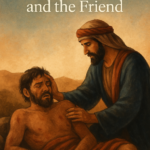
Mary Magdalene After the Resurrection
June 19, 2025
To the stranger and the friend
July 1, 2025
Mary Magdalene After the Resurrection
June 19, 2025
To the stranger and the friend
July 1, 2025Human intelligence is inquisitive; thus, it inquires about its surroundings, events, origins, and existence. God is the central subject in the attempt to make sense of who we are; where did we come from? And where are we going? This inquiry is possible only based on what is knowable using our five senses. Therefore, any attempt to know God is possible only from what He revealed to us, which appeals to our five senses. William M. Arnett describes how one of the leading theologians, Paul Tillich, put this into perspective. He states that according to Tillich,
God does not exist because existence is a category of dependence. He, therefore, repudiates the “so-called proofs” for the “so-called existence” of God. Since God is beyond essence and existence, “it is as atheistic to affirm the existence of God as to deny it.” “The existence of God” is “in itself an impossible combination of words. God does not exist, says Tillich, but is rather the ground of all existence.
The pursuit of knowing God, the ground of all existence, differs from studying all other branches of knowledge because they are confined to time and space. Physical sciences and even transplanetary expeditions fall into the same category. They all deal with visible materials and invisible forces and their effects. In contrast, God, as the subject of ‘knowing,’ transcends space and time. Therefore, the quest for hard evidence in the time-space realm to know God is inadequate for comprehending who God is.
The popular depictions of God, as He is understood to be living, reveal that He is the Father, God is a person; He is spirit, holy, almighty, and all-knowing, and so on, in a literal sense, may portray God as a being alongside other beings. It may lead to posing questions like: Can God create a stone that He cannot lift? Or can God lie? Which is a categorical error. The unlimited ability of God is not measured in terms of His capability to create a heavy object or the strength to lift it. Similarly, God’s moral nature cannot be judged by the specific context of a fact because God is the source of truth and the ultimate judge who determines the ultimate truth. Therefore, these depictions must be understood metaphorically to represent God’s attributes, character, and qualities as a supreme and sovereign being, unique.
The human pursuit of knowing God may begin with admitting the limits of
- 1) human capabilities to comprehend the ineffable magnitude of the reality of the universe, as it is presented to us today, the cosmic events and the events on earth (history), and
- 2) the scope of the means available for humans to know God, the tools, methods, and premises that include concepts, ideas and language.
Determining the scope of the inquirer’s (humans) understanding places them more dependent on the object of search (God) rather than relying on the inquirers’ knowledge and abilities. Three objective factors God provided us are nature, the Word of God and the person and work of Jesus Christ. Three subjective factors are personal experiences that point towards the work of God in an individual’s life, feelings and emotional responses that arise from ongoing grappling with the reality of God (various forms of worship, meditation of his Word, prayer), and finally, one’s nature of urge to relate, communicate, appreciate and judge. The mutual validation of one’s subjective experience against the objective factors leads us to an understanding of God. It is dynamic and progressive. Those who come to the awareness of God continue to enjoy God, delving more into the factors that lead us to God.

Leave a Reply